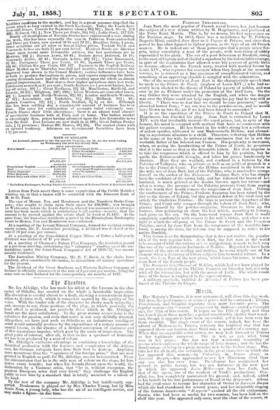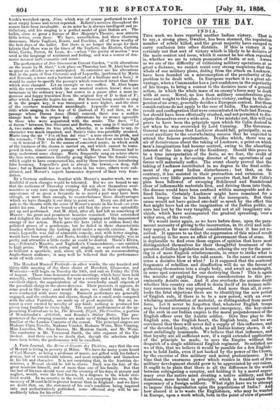Muir.
Her Majesty's Theatre, it is now announced, will close this day week. Till then, the performances at reduced prices will be continued ; Titiens, Piceolomini, and Giuglini repeating their most favourite parts. The regular season—the " season " recognized by fashion—ended a fortnight ago, the 17th of this month. It began on the 13th of April and thus has lasted about three months ; a period considerably shorter than usual: and, though it appears to have been successful, yet it has been very far from eventful. The single event of the season, indeed, has been the advent of Mademoiselle Titiens, certainly the brightest star that has appeared above our horizon since Grisi rose a quarter of a century ago. When that incomparable artist retires, we may look forward to Titiens
as her legitimate successor. She is not, as yet, what Grisi was in her prime. She has not that wonderful versatility of genius which embraces the whale range of lyric drama ; and she has the disadvantage of being in a great measure new to the Italian stage. But, take her for ull in all, she certainly, in the great characters in which she has appeared this season,—in Valentina, in Donna Anna, in Luere:ia Bogia,—has approached nearer her illustrious rival than any one else has ever done. Piceolomini has maintained her ground in public favour, but was not fortunate in the new part in which she appeared, Luisa Miller—not from her fault, but that of the opera, one of the weakest of Verdi's productions. Giu- glini, too, has completely maintained his ground ; and, indeed, added to his laurels by his fine performance of Raoul in the Huguenots. Alboni had the good sense to resume her character of Orsini in Luerezia Borgia which slie had abandoned for several years; and her inimitable singing of the famous Anacreontic "II segreto" excited all the old enthusiasm. Spezia, who had been so useful for two seasons, has been laid on the shelf this year. She appeared only once, near the close of the season, ha
Verdi's wretched opera, Nino, which was of course performed to an al- most empty house and never repeated. Belletti's services throughout the season have been invaluable : as an actor he is always intelligent and sa- tisfactory, and his singing is a perfect model of pure Italian art. The ballet, once so great a feature of Her Majesty's Theatre, now attracts little notice, even there. We have, nevertheless, had three charming danseuses, Marie Taglioni, Rosati, and Poechini, all of them worthy of the best days of the ballet. But there is no longer the scope for their talents that there was in the times of the Taglioni, the Elsslers, Carlotta Grisi, Cerito, Perrot, St. Leon, 8m—when "the poetry of motion" was used as the language of sentiment and feeling, and was a source of dra- matic interest both romantic and comic.
The performance of Don Giovanni at Covent Garden, "with alterations on the music by M. Atari," took place on Thursday last. M. Alan has been as great an offender as we anticipated. So extensive are his alterations that in the parts of Don Giovanni and of Leporello, (performed by Mario and Ronconi, a tenor and a baritone instead of a baritone and a bass,) it would be easier to specify the passages which remained intact than those which were changed. Let an example or two suffice. M. Alan began with the very overture, which (as our musical readers know) does not terminate in the ordinary way ; but comes to a pause after a most in- genious and happy transition from the original key of D to that of F; after which, Leporello begins his air. But Ronconi being unable to sing it in the proper key, it was transposed a note higher, and the close of the overture transformed accordingly. Leporello went on for a little while singing in the key of G (instead of F) and then, at the passage where Donna Anna (Grisi) entered, there was a sudden change back to the proper key : alterations by no means agreeable to those who were acquainted with the music. The duet, "La ei darem" between Don Giovanni and Zerlina, was sung in C instead of A, two notes above its true pitch, whereby, it is needless to say, its character was much impaired, and Bosio's voice was painfully strained. Mario sang the air "Fin eh'han dal vino" a note above its pitch, and the serenade, " Deh vieni ails finestra " no less than four notes too high —in G instead of D! In the scenes of concerted music, in which much of the business of the drama is carried on, and which cannot be trans- posed in toto, almost every passage which Mario and Ronconi had to sing, underwent some change. Mario frequently sang an octave above the true notes, sometimes literally going higher than the female voice, which ought to have surmounted his, and by these inversions introducing false harmony. Leporello's part is always the lowest,—a deep, full bass • but as Ronconi has no such notes in his voice, others were sub- stitued, and Mozart's superb harmonies deprived of their very foun- dation.
By a German audience, familiar with Mozart's master-work, we are doubtful if such changes would be tolerated. But we are bound to say that the audience of Thursday evening did not show themselves over- sensitive or very irate upon the subject. Possibly, in their opinion, the appearance of so great a favourite in so novel a part may have been enough, or more than enough, to counterbalance those disadvantages which we have thought it our duty to point out. Every one did not re- pair to the theatre with the score of Mozart's music in his head—or even under his arm. And we are bound to add that the piece was splendidly got up and performed. And M. Alan, after all, had left us something of Mozart : the great and prominent beauties remained. Grisi astonished and delighted the audience by her exquisite singing and the impassioned energy of her action. Mario gave the hero (what is seldom done) the polished graces of a gentleman; but he failed in those characteristic touches which betray the lurking devil under a smooth exterior. Ron- conrs Leporello was full of admirable comedy, and, with better singing, would have been perfect : and Bosio, besides singing charmingly, was LIS pretty and attractive a little rustic as could be desired. Marais Elvira, too,—Polonini's Masetto, and Tagliafico's Commendatore,—are entitled to high praise. With such acting and singing, so superb an orchestra, so brilliant a spectacle, and, above all, with such an accommodating Anglo-Saxon audience, it may well be believed that the performance went off with éclat.
The Hereford Musical Festival—in other words, the one hundred and thirty-fifth meeting of the three choirs of Hereford, Gloucester, and Worcester—will begin on Tuesday the 24th, and end on Friday the 27th of August. These time-honoured music-meetings, which have been held annually, without interruption, for near a century and a half, are for an excellent object, the augmentation of the wretchedly small stipends of the parochial clergy in the above dioceses. Their proceeds' it appears, do some good in this way ; and would do more, we should think, if they were conducted with more energy. Eminent performers are generally engaged, and the orchestra and chorus, though on a small scale compared with the other Festivals, are made up of good materials. But no in- terest is ever excited by novelty of any kind ; nothing is produced but pieces long familiar to every body. The sacred performances at the ap- proaching Festival arc to be, The Messiah, Elijah, The Creation' a portion of Mendelssohn's althaliah, and Rossini's Stabat Mater. The pro- grammes of the evening concerts are made up of things which have been familiar at the London Concerts of the season. The principal singers are Madame Clara Novelle, Madame Viardot, Madame Weiss, Miss Vinning, Miss Lascelles, Mr. Sims Reeves, Mr. Montem Smith, and Mr. Weiss. The conductor is Mr. Townsend Smith, the able organist of the Ca- thedral. And there can be no doubt that, thongh the selection might have been better, the performance will be excellent.
A Paris Journal, the Revue et Gazette des Thedtres, says that the son of Mozart is living in poverty at Milan. We have for many years heard of Carl Mozart, as being a professor of music, not gifted with his father's genius, but of considerable talents, and most respectable and blameless in his life and character. It is not surprising that, in the Austrian do- minions, a Mozart should be left to starve. Such was the fate of the great musician himself, and of more than one of his family. But that the last of his race should wear out the evening of his days in penury and neglect, would, were the fact known, be a disgrace to the whole civi- lized world. In no country in the world, net excepting his own, is the memory of Mozart held in greater honour than in England : and we have no doubt that, on, the statement of his son's condition being inquired into : and authoritatively published, some effectual step will be an- maiately taken for his relief.



























 Previous page
Previous page